US election 2020: The people behind the political memes you share
- Published

Rafael and Omar Rivero; Dan Bongino
You probably haven't heard of Dan Bongino, but if you are on Facebook you might have seen one of his posts. You may have even shared one.
Dan Bongino is ex-NYPD and Secret Service and also worked as presidential protection for two presidents - George W Bush and Barack Obama.
Now a prolific right-wing commentator, in the last two months his Facebook posts have attracted more shares than those of Fox News and CNN, combined.
But he's not the only one to have an outsized influence over America's social media conversation.

As the election campaign became more intense, a very small group of personalities and social media accounts on both sides of the political divide have resonated with audiences in a way even politicians and media organisations have not.
Their rapid surge in popularity has seen such people generate more social media interactions than almost every politician and major publisher.
They have become this election's "influencers" - with strong but pithy opinions, picking up what they see as political contradictions and hypocrisy. Some make memes, others just inspire the meme-makers with their ironic observations.
"My life is all about owning the libs now," said Mr Bongino two years ago. He attacks the left and defends President Trump in a direct and aggressive style - not being part of the traditional political establishment seems to be part of his appeal.
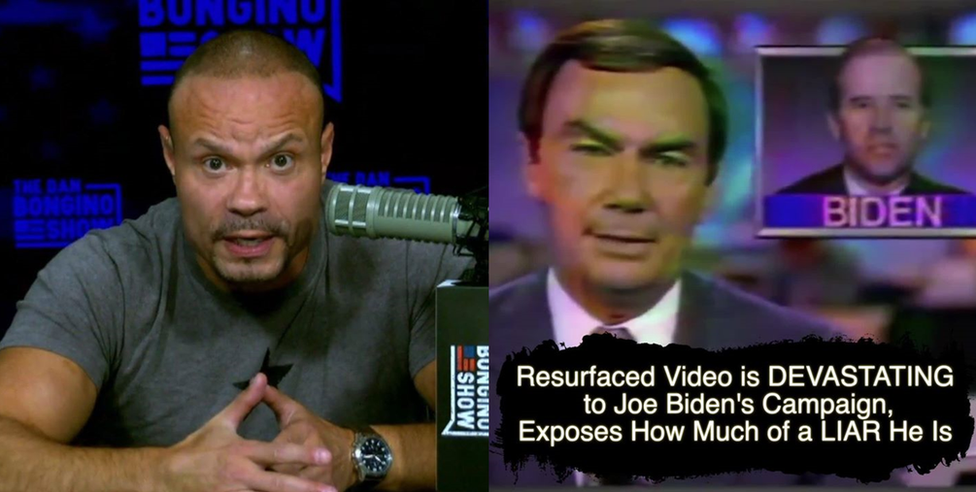
Dan Bongino hosting his show (left); One of Bongino's most shared Facebook videos (right)
He is also very critical of mainstream media (although he is himself a commentator on Fox News) and a section of his website is dedicated to "debunking liberal myths". Some of his most successful posts have titles like "Exposing how much of a liar Joe Biden is" and "Fact-checking Kamala Harris' fake Lincoln quote at the debate". He has been criticised and fact-checked himself many times - but that hasn't stopped people sharing his posts.
One video montage of Ronald Reagan's speeches on law and order had almost as many shares as all New York Times Facebook posts in the previous month.
Mr Bongino has recently told The New York Times, external that he doesn't know what's behind this rapid increase but attributes his success to his team and Facebook's user base - older and more conservative than other social networks.
Conservative voices have been particularly strong on Facebook during this campaign.
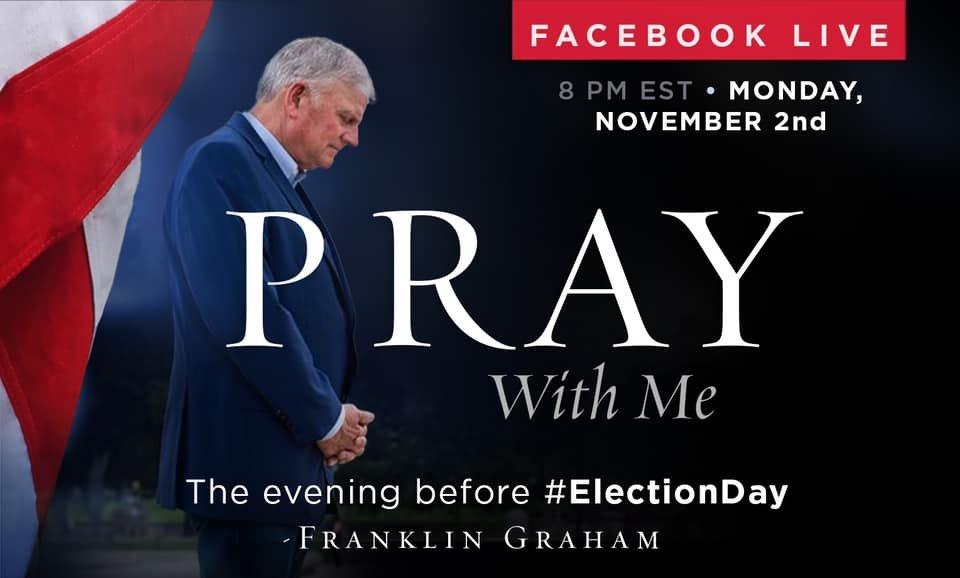
Evangelist Franklin Graham organised a Facebook collective prayer in support of President Trump
Franklin Graham, son of late preacher Billy Graham, is one of the most influential evangelicals in America. His Facebook posts are consistently among the most shared, whether he is praising Trump's foreign policy, urging followers to pray for the president's victory or sharing discredited theories about the origin of the coronavirus pandemic.
Hollywood actor James Woods returned to Twitter the start of 2020 after a 10-month hiatus. Woods's account has been suspended multiple times for spreading conspiracy theories and violating the platform's rules. His blistering attacks on Democrats are often screenshotted and widely shared by pro-Trump accounts on other social platforms.
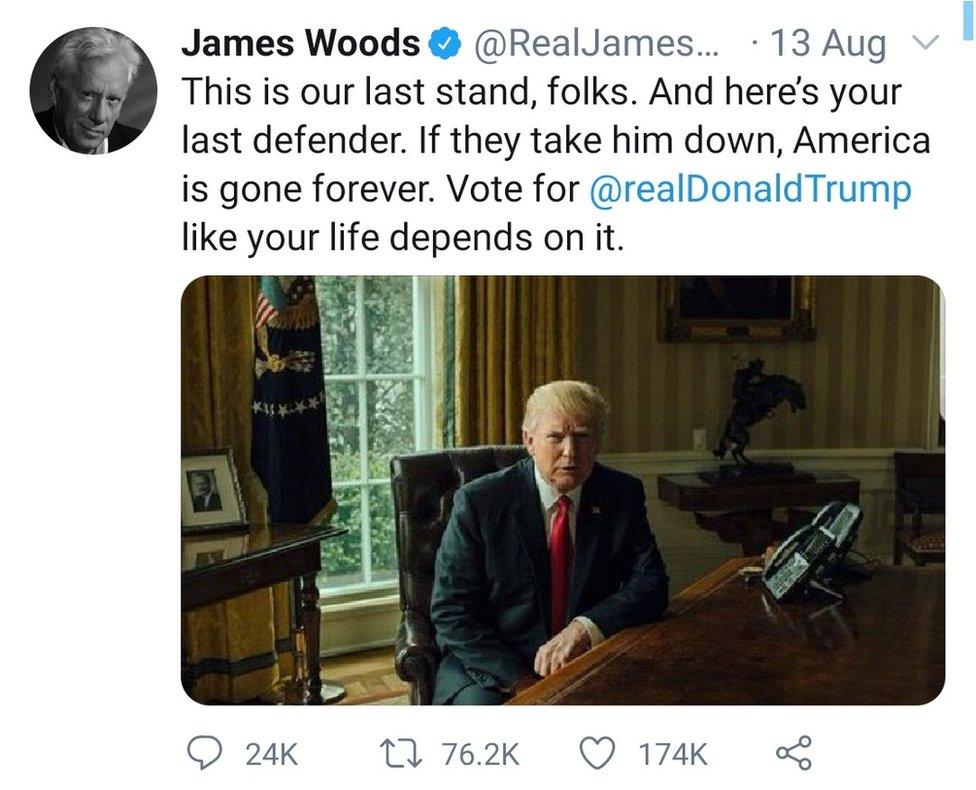
One of James Woods' most successful tweets

One progressive (the more liberal-leaning end of the Democratic Party) page is winning the meme war.
Occupy Democrats, founded in 2012 by immigrant twin brothers Rafael and Omar Rivero, amasses millions of shares every month with its text heavy, highly partisan pictures. The page had more shares than Donald Trump's official account this month.
When Bernie Sanders suspended his campaign in April, Rafael Rivero started a new page, "Ridin' With Biden", which quickly surged to a rapid success. The brothers run other popular accounts, including "Impeach Trump" and "Fight Trump".
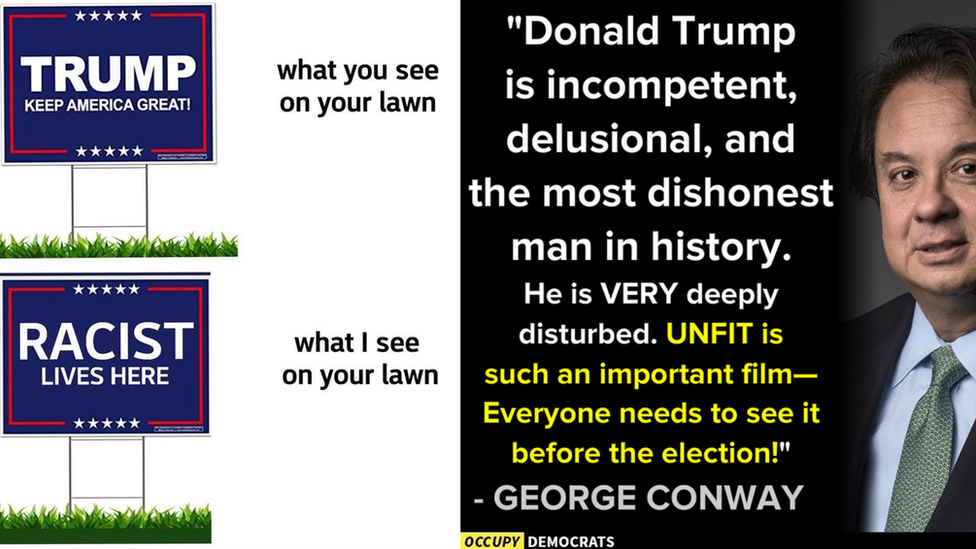
Two of the most shared Occupy Democrats memes on Facebook
Robert Reich, economic adviser and former US Secretary of Labor, has served in the administrations of three Democratic presidents. His tweets and memes attacking Trump and criticising economic inequality are hugely popular with left-leaning Americans on social media. Reich is arguably the biggest left-wing personality on Facebook - in October, his page had more shares than Joe Biden and Barack Obama combined.
It is well known that Facebook and Twitter have been battlegrounds for years, but Instagram hasn't always seemed like a natural place for political activism.
In 2020 this has changed as the pandemic and the protests following George Floyd's death generated a huge increase in social justice content being widely shared on Instagram.
"We don't think you should need to have a degree, or to be able to afford to get behind paywalls, in order to understand the world around you, so we try to break it down into simple, digestible round-ups," said Lucy Blakiston, one of the co-founders of SYSCA, a hugely popular account she runs from New Zealand.
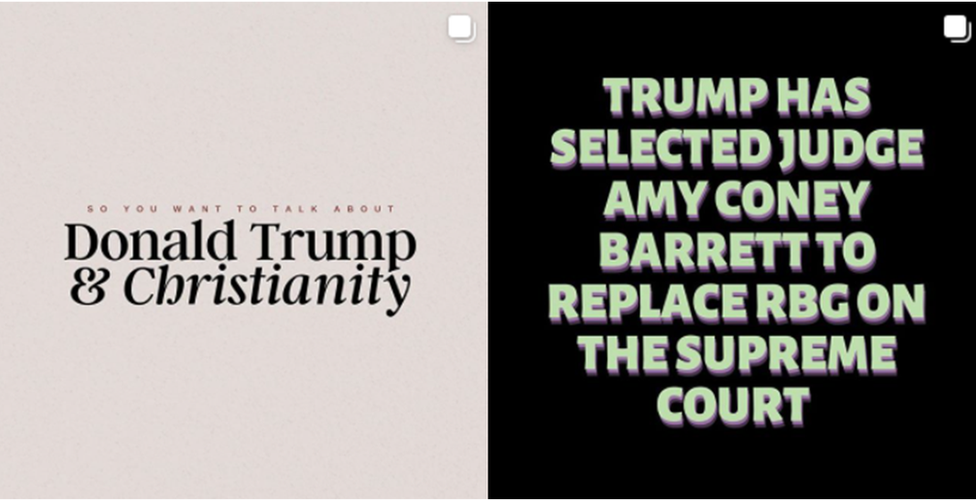
Popular slideshow-style Instagram posts.
Ms Blakiston and two other young women started the project in 2018, while all three were at university. Two of them now have full-time jobs, and run SYSCA on the side. Their Instagram account has grown from fewer than 100,000 followers at the start of this year to over 2 million, more than most progressive media brands. To put this into context, it took The Guardian almost four years to get its Instagram following to that level.
It is not news that in a highly polarised landscape, activism can drown out impartial information and many have warned that social media "echo chambers" mean people only see and share content which matches their political point of view.
"I think our US election coverage has made an impact, but among people who already think similarly to how we do," said Ms Blakiston.
"We are from New Zealand, a place where we are lucky enough to have a leader who we can trust to look after us in times of need," she added. "We look at how things are going in America and think that everyone deserves to have a leader that they trust to look after them."

Popular slideshow-style Instagram posts
Slideshow explainers seem to have resonated really strongly with Instagram's younger and more progressive audiences. Progressive accounts dedicated to this format, like "So You Want To Talk About..." now generate a number of interactions comparable to major news outlets.
This small group of influencers have clearly benefited from the divisive nature of an election campaign - many posts take advantage of schadenfreude (glee at another's misfortune), one-upmanship and function as digital calls to action.
But there are also hints that things could change - these highly liked posts featuring moments of unity show positive messages can and do break through.
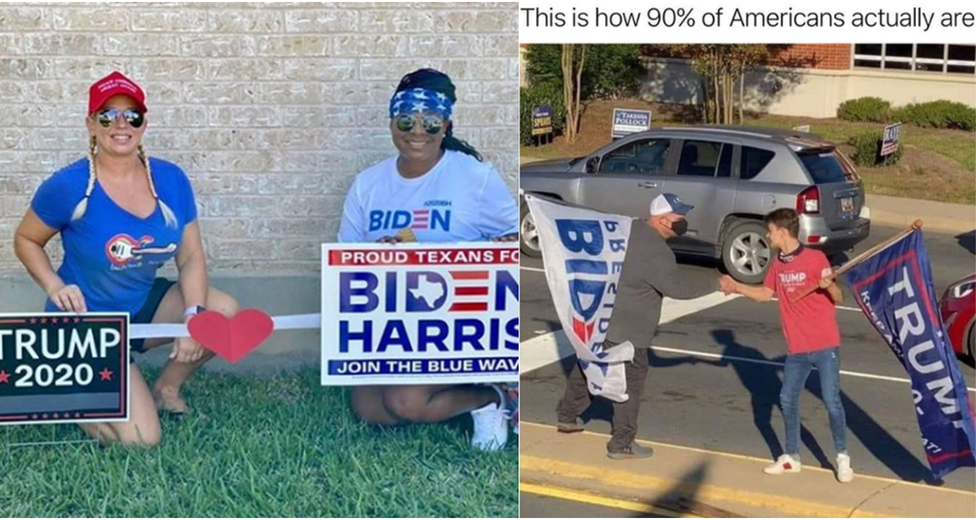
Moments of unity between Biden and Trump supporters.
